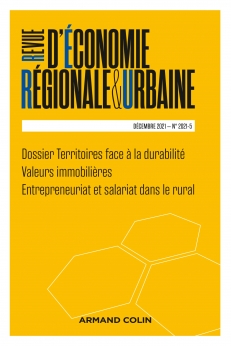
REVUE D'ÉCONOMIE RÉGIONALE ET URBAINE (5/2021)
Pour acheter ce numéro, contactez-nous
Recevez les numéros de l'année en cours et accédez à l'intégralité des articles en ligne.
L’hypothèse centrale du présent article est que la résilience dynamique des territoires postsocialistes repose avant tout sur la temporalité et le contenu des stratégies déployées par les acteurs locaux. Sur la base de trois études de cas extensives réalisées au plan longitudinal, l’article reconstitue les trajectoires de restructuration économique des trois métropoles régionales de Roumanie – Timișoara, Cluj-Napoca et Iași. L’analyse comparative des trois cas valide l’hypothèse : une mobilisation proactive et synchrone d’acteurs de la triple-hélice (État-Entreprises-Recherche) est essentielle pour la création et le renforcement d’un nouveau sentier de développement, mais ce dernier est également dépendant des capacités et des atouts locaux différenciés au sein du territoire. L’article montre que la continuité dans le temps d’une attitude proactive de la part de toutes les catégories d’acteurs est essentielle.
The present paper tests the hypothesis that dynamic resilience of post-socialist regional metropolises is mainly based on the temporality and on the strategic direction chosen by local actors. Facing the same challenges (globalization and metropolisation), inside of the same socio-political regime (post-socialist, transition country), territories may follow different adaptive paths to the new economy. The study is based on extensive case studies concerning the economic restructuring path of three regional metropolises of Romania – Timișoara, Cluj-Napoca and Iași. The analysis is structured throughout an adapted version of the framework developed by Hamdouch et al. (2012), which spots the content, the openness and the temporality of adaptation strategies used by different local actors in dealing with globalization and transition to market economy. The results demonstrate that even without a strong cohesion among local actors, the synchronisation of their individual strategies as well as their ability to capitalize on the strengths of their respective regions can foster a time effective and sustainable transition to the globalized economy. At the same time, the case studies revealed the particularly important role played by two categories of actors – local government and university – due to their capacity to build wider strategies contributing to overall local development. On the other hand, where a local entrepreneurial and cooperation culture exists (such in the case of Cluj-Napoca), a rather neutral position of the government in the early phase of transition proved to be an appropriate choice, while a more engaged position was able to foster the internationalisation and the attractiveness of the city during the later phases of transition. We conclude that the continuity of a proactive behaviour of different categories of actors is essential for resilience, as the strategies must be constantly adapted to the new challenges and opportunities revealed across the evolutionary path.